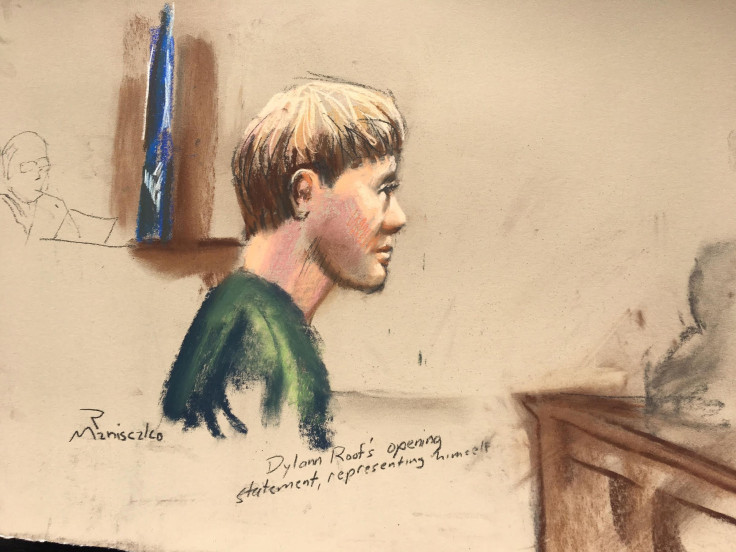Does Dylann Roof Want The Death Penalty? How The Charleston Killer Might Be Sabotaging His Sentence

Dylann Roof gave a brief opening statement Wednesday during the sentencing phase of his federal murder trial, saying only that he chose to represent himself to prevent his lawyers from presenting mental health evidence. The 22-year-old white nationalist, who was convicted in December of murdering nine parishioners at a historically black church in Charleston, South Carolina, last year, has been representing himself. Prosecutors are seeking the death penalty.
“I’m not going to lie to you, either by myself or through somebody else,” Roof told the jury. “There’s nothing wrong with me psychologically.”
Roof fired his legal team and elected to represent himself during the sentencing phase of his trial after finding out they were planning to enter mental health evidence in order to convince the jury he should not be put to death.
Is that what Roof, who said he committed the massacre to start a “race war,” really wants?
At his arraignment, Roof wanted to plead guilty to all 33 charges he was eventually convicted of. However, his lawyers entered a not guilty plea, saying they couldn’t enter a guilty plea without knowing if the prosecution would seek the death penalty.
By firing his attorneys, who included capital defense expert David Bruck, Roof has chosen to take on highly-trained federal prosecutors in a trial for his very life with just a ninth grade education. He has stated he will offer no evidence and call no witnesses. He has also shown no remorse for his crime. His only defense, which is no defense at all, is to insist he is mentally fit, a move that seems to indicate either a desire to die as a martyr or a delusional mind.
Of course, the line between the two is very, very blurry.
“If you are not crazy, and you have some political commitments, yes you are entitled to go down as a martyr for the cause,” Eric M. Freedman, a professor of constitutional rights at Hofstra University in Hempstead, New York, told the International Business Times. “Just as a competent person can make stupid decisions, a competent person can make grand political gestures.”
However, Freedman has doubts about Roof’s competency.
“It would seem pretty clear that what is happening here is a mentally unstable individual is being wrongly allowed to conduct an incredibly stressful and legally complex court proceeding,” Freedman said. “That makes no sense from any perspective. It guarantees a distorted result as well as an infinite spiral of legal complexity to no clear purpose."
The court has found, repeatedly, that Roof is legally competent, understands his actions, and can represent himself. So far, his only legal strategy has seemed to be to prove his sanity and mental health, assertions which would seem to make the jury more, not less, likely to hand down the death penalty.
From sentencing hearing: a handwritten journal entry that #DylannRoof wrote in jail six weeks after his arrest:https://t.co/qAU55bqqAn pic.twitter.com/75FotqRCTY
— Ally (@newscat44) January 4, 2017
On Monday, Judge Richard Gergel ruled after a closed all-day hearing that Roof was competent to represent himself during the sentencing phase — in spite of the objections of his own legal team, which has doubts about Roof’s competency, saying he “may lack the mental capacity ” to serve as his own lawyer.
Roof’s lawyers tried to cast doubt about Roof’s mental state throughout the trial, using words such as “abnormal,” “delusional,” and “suicidal,” the New York Times reported.
Roof has not apologized for the massacre at Emanuel AME Church, nor has he shown any remorse. In opening remarks on Wednesday, federal prosecutors read a page from Roof’s prison journal that was written six weeks after the shooting. In it, he wrote that he wrestled with the fact that he was in prison and wished he could watch a movie, only to then reflect on the killings and realize “it was worth it.”
Life in prison isn't easy for Roof. In August, he was assaulted in the Charleston County Detention Center by a black inmate. Roof was not seriously injured, but the inmate who assaulted him, Dwayne Stafford, became something of an internet sensation. Strangers from across the world went online to deposit funds into his commissary account. It’s not hard to see why Roof might not want a lifetime of looking over his shoulder.
If Roof is sentenced to death, he will be the first federal inmate sent to death row since Boston Marathon bomber Dzhokhar Tsarnaev was given the death penalty in 2015. If Roof is actually put to death, he would be only the fourth person executed by the federal government since the death penalty was reinstated in 1988, and the first since 2003.
Roof wouldn't be the first person to plan on sabotaging his own defense in an effort to die for his cause. In 2002, Zacarias Moussaoui, the would-be 20th 9/11 hijacker, was deemed competent to represent himself and used the opportunity to deliver diatribes against the U.S. government. Moussaoui was found guilty in federal court and sentenced to death.
However, martyrdom would have to wait. More than a decade and a half later, Moussaoui is still alive in a federal prison. Roof would likely have the same fate. Even if Roof was sentenced to death, and even if he declined to appeal his sentence, attorneys associated with the federal courts will likely submit years' worth of appeals on his behalf.
"As a practical matter, any death sentence in this case will be appealed and will appealed by lawyers," Freeman said.
© Copyright IBTimes 2024. All rights reserved.





















